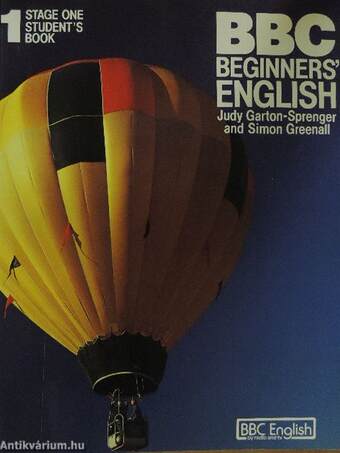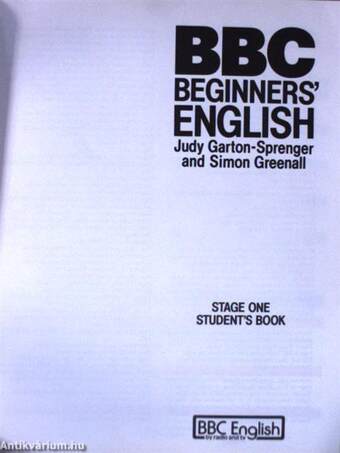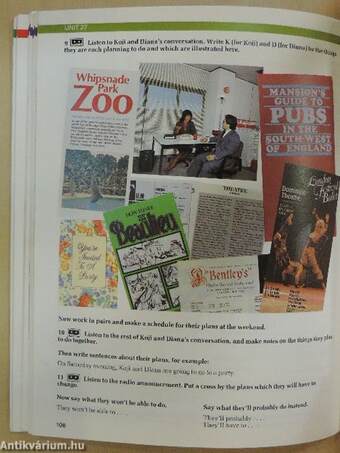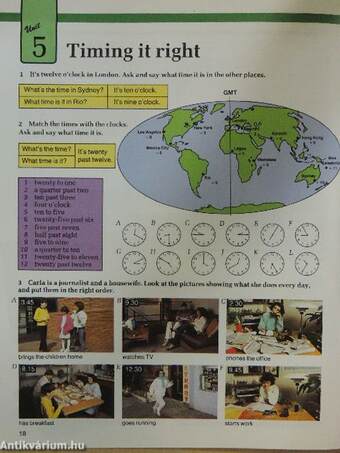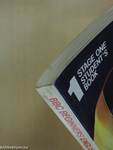1.067.339
kiadvánnyal nyújtjuk Magyarország legnagyobb antikvár könyv-kínálatát

VISSZA
A TETEJÉRE
JAVASLATOKÉszre-
vételek
BBC Beginners' English 1. - Student's Book
| Kiadó: | BBC English by Radio & Television |
|---|---|
| Kiadás helye: | London |
| Kiadás éve: | |
| Kötés típusa: | Fűzött papírkötés |
| Oldalszám: | 162 oldal |
| Sorozatcím: | BBC English |
| Kötetszám: | |
| Nyelv: | Angol |
| Méret: | 24 cm x 19 cm |
| ISBN: | 0-946675-90-2 |
| Megjegyzés: | Színes és fekete-fehér fotókkal, illusztrációkkal. |
naponta értesítjük a beérkező friss
kiadványokról
naponta értesítjük a beérkező friss
kiadványokról
Fülszöveg
BBC BEGINNERS' ENGLISH A two-stage course, designed to be used in the classroom by adults and secondary school students, studying English as a foreign language. The course enables students to use English in a variety of practical and real-life situations. BBC BEGINNERS' ENGLISH follows the same syllabus as the successful radio series, TAKING OFF. This course aims to help Iearners to achieve a variety of educational objectives and to tackle a broad rangé of communicative tasks. The students' involvement in these aims is ensured by the following features: ¦ Communication practice in social and professional contexts ¦ Realistic activities and tasks ¦ Exposure to national and international variations of English ¦ A learner-centred approach ¦ A balance between communicative activities, structure practice and grammar ¦ Systematic skills development COMPONENTS OF BBC BEGINNERS' ENGLISH STAGE ONE STUDENT'S BOOK 30 units (120-150 hours) of teaching material, in full-colour, and a Language... TovábbFülszöveg
BBC BEGINNERS' ENGLISH A two-stage course, designed to be used in the classroom by adults and secondary school students, studying English as a foreign language. The course enables students to use English in a variety of practical and real-life situations. BBC BEGINNERS' ENGLISH follows the same syllabus as the successful radio series, TAKING OFF. This course aims to help Iearners to achieve a variety of educational objectives and to tackle a broad rangé of communicative tasks. The students' involvement in these aims is ensured by the following features: ¦ Communication practice in social and professional contexts ¦ Realistic activities and tasks ¦ Exposure to national and international variations of English ¦ A learner-centred approach ¦ A balance between communicative activities, structure practice and grammar ¦ Systematic skills development COMPONENTS OF BBC BEGINNERS' ENGLISH STAGE ONE STUDENT'S BOOK 30 units (120-150 hours) of teaching material, in full-colour, and a Language Review section for Pronunciation and Structure Practice WORKBOOK 30 units of additional practice material TEACHER'S BOOK detailed lesson notes, suggestions for further work, an answer key, the tapescript and a statement of the methodology CLASS CASSETTE SET the recordings for the Student's Book LANGUAGE REVIEW CASSETTE SET the recordings for the Pronunciation and Structure Review exercises in the Student's Book, for classroom or language laboratory use VisszaTartalom
ContentsFUNCTIONS STRUCTURES TOPICS PAGE
1 MEETING PEOPLE 1
Greeting and meeting people; Asking and saying who people are, where they're from Present simple to be; possessive 's; personal pronouns Countries; forms of address; family
2 GETTING TO KNOW PEOPLE 6
Asking and saying what people do, where they live Present simple to do, to live; possessive adjectives Jobs, nationalities
3 TALKING ABOUT WHERE PEOPLE LIVE 10
Asking and saying how many, what there is, what people have got, how to spell Quantity, plural -s; have got; questions with do as auxiliary Rooms of the house, furniture, numbers 1-12, alphabet
4 TALKING ABOUT WHAT YOU LIKE AND WHAT YOU CAN DO 14
Asking and saying what you like, can do; Agreeing and disagreeing Like + -ing, modal can; So/Nor/Neither do I. Sport, leisure activities, town facilities
5 TIMINGIT RIGHT 18
Talking about routine activities; Asking and saying what people are doing, would like to do, what the time is; Making suggestions; Inviting, accepting, and refusing invitations Present simple for habitual actions; present continuous; want/would like to; Why don't we . . . ? Let's . . . Numbers to 50; routine activities, time-telling, leisure activities
6 CHECKING WHAT YOU KNOW 22
Revision
7 GOING TO TOWN 26
Asking and saying where places are, what people want, where you can get things, how much/many, how much things cost in, opposite, next to; countables/uncountables; a, somé, any; How much/many? Shops, shopping, food, clothes, colours
8 PLANNING A JOURNEY 30
Asking and saying what the date is, how long journeys take; Asking for and giving information Present simple for time- tables; How long does it take? on, in, at for times/dates Transport; months, days dates, times, ordinal numbers
y DESCRIBING PLACES-TALKING ABOUT ARRANGEMENTS 34
Asking and saying where places are, what places are like, what people's plans are Present continuous for future, prepositional phrases of place Geographical location, features, countries, travel documents; large numbers
FUNCTIONS STRUCTURES TOPICS PAGE
10 TAKING A BREAK 38
Making requests, agreeing to and refusing requests; Asking for and giving directions Can you/I . . . ? Imperatives for directions; Is/Are there . . .? Hotel facilities, street directions, tourist facilities and sights
11 GETTING WHAT YOU WANT 42
Asking what words mean; Ordering a meal; Offering, making requests; Saying what you must/mustn't do must, mustn't; something to eat/drink; Can/Could you . . . ? Food, restaurants; British and American English; instructions; hotels
Il2 CHECKING WHAT YOU KNOW 46
Revision
13 TALKING ABOUT THE PAST (1) 53 Mj& J- ' , ¦mfym / - .<¦ 5(f
Asking and saying what happened in the past, and when Past simple; prepositional phrases of time Leisure activities, times of the day
14 TALKING ABOUT THE PAST (2) 54
Asking and saying when things happened in the past, and how long Past simple; ago, for, and other time phrases Education; family, dates, travel
15 LOOKING AHEAD sá
Talking about future plans and intentions; Giving advice, instructions; Agreeing and disagreeing going to; should/shouldn't; sequencers; I think so too. No, I don't think so Clothes, household equipment, rooms, colours, patterns
16 DESCRIBING APPEARANCE 62
Asking and saying what people look like, how old they are, what they are wearing, what colour hair/eyes, how tall; Giving compliments What/Who does he look like? What faj + adjective + noun Personal description: age, size, height, colour of hair and eyes, clothes
Í7 SEEING THE DIFFERENCE 66
Making comparisons; Asking and saying how people look, feel, sound Comparative, superlative of adjectives; than; look/ feel/sound + adjective Description of places, people, emotions
18 CHECKING WHAT YOU KNOW 70Í
Revision
19 SAYING HOW YOU FEEL
Asking and saying what things
are called, what people think,
how people feel;
Agreeing and disagreeing;
Making suggestions and giving
advice, sympathising
It makes me + adjective
Idon'tfeel very weil
Oh, I am sorry
Parts of the body; emotional
reactions; illness and
ailments
20 DOING THE RIGHT THING
Asking and saying what people
have to do, mustn't do;
Asking for permission,
giving/refusing permission
have to, have got to, need
to, must, mustn't, can't; Do
you mind if ... ?
Travel arrangements; household arrangements; baggage
FUNCTIONS STRUCTURES TOPICS PAGE
21 MAKING THINGS CLEAR 82
Making suggestions, agreeing and disagreeing with suggestions; Asking for and giving reasons; Asking and saying which one(s) Infinitive of purpose; this Shopping items and gifts, one/that one etc.; What/How shops and services, clothes, about . . . ? Something to colours + infinitive
22 DESCRIBING OBJECTS 86
Asking and saying where things are; Describing objects, asking and saying what things are made of Prepositional phrases Description of places, buildings, objects; shape, size, material
23 EXPLAINING WHAT TO DO 90
Giving instructions; Giving advice Sequencers; Always/Never + imperative; Make sure you . . . Don't forget to . . . Notices and signs; parts of the car; first aid; tourism
24 CHECKING WHAT YOU KNOW 94
Revision
25 LEADING UP TO THE PRESENT 98
Asking and saying what people have done, and for how long Present perfect; for, since; superlatives of adjectives Sightseeing, town facilities, leisure activities
26 TALKING ABOUT RECENT EVENTS 102
Asking and saying what people have or haven't done yet, what has just happened Present perfect; just and yet Routine activities; news items
27 TALKING ABOUT THE FUTURE (1) 106
Asking and saying what the weather will be like, talking about plans for the future Future simple; I think, I expect . . . ; Conditional sentences (type 1) Weather, seasons; leisure activities
28 TALKING ABOUT THE FUTURE (2) 110
Making requests, agreeing to and refusing requests; Offering, accepting and refusing offers; Making suggestions, talking about plans Future simple; I'll . . . shall I?; Why don't we . . . ? I think we should . . . We'regoingto . . . Banking; numbers
29 SAYING WHAT YOU THINK 114
Talking about similarities and differences; Saying what you think; Making suggestions, agreeing and disagreeing Let's . . . , What about + -ing? So do l/Nor do I, etc. Personal details, personal background
30 CHECKING WHAT YOU KNOW 118
Revision
LANGUAGE REVIEW 122
Pronunciation and Structure Review
Témakörök
- Idegennyelv > Idegennyelvű könyvek > Angol > Nyelvészet
- Nyelvészet > Idegen nyelvek > Tanulása
- Idegennyelv > Nyelvtanulás > Nyelvtanítás > Nyelvkönyv
- Idegennyelv > Nyelvtanulás > Nyelvek > Angol > Tanfolyamok > Alapfok
- Tankönyvek, jegyzetek, szöveggyűjtemények > Nyelvtanulás > Angol > Tanfolyamok > Alapfok



